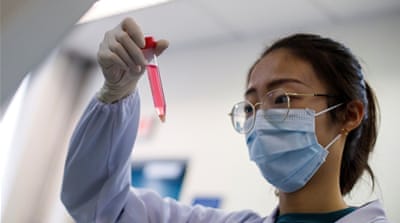
A genetic analysis of samples from more than 7,500 people infected with Covid-19 suggests the virus spread quickly around the world late last year and is adapting to its human hosts.
A study by scientists at University College London’s (UCL) Genetics Institute found almost 200 recurrent genetic mutations of the coronavirus – SARS-CoV-2 – which the researchers said showed how it may be evolving as it spreads in people.
Francois Balloux, a UCL professor who co-led the research, said results showed that a large proportion of the global genetic diversity of SARS-CoV-2 is found in all of the hardest-hit countries. That suggests that the virus was already being transmitted extensively around the globe from early on in the epidemic.
Balloux said:
All viruses naturally mutate. Mutations in themselves are not a bad thing and there is nothing to suggest SARS-CoV-2 is mutating faster or slower than expected.
So far we cannot say whether SARS-CoV-2 is becoming more or less lethal and contagious.
Balloux said the 198 small genetic changes, or mutations that the study identified appeared to have independently occurred more than once.
These may hold clues to how the virus is adapting and help in efforts to develop drugs and vaccines. Ballouz explained:
A major challenge to defeating viruses is that a vaccine or drug might no longer be effective if the virus has mutated.
If we focus our efforts on parts of the virus that are less likely to mutate, we have a better chance of developing drugs that will be effective in the long run.
The UCL team’s findings, published on Wednesday in the journal Infection, Genetics and Evolution, confirm that the virus emerged in late 2019, Balloux said, before quickly spreading across the globe.
The study was not able to confirm the exact starting point or location.
A study by French scientists published earlier this week found a man there was infected with Covid-19 as early as 27 December, nearly a month before France confirmed its first cases.
The World Health Organization said the French case was “not surprising” and urged countries to investigate any other early suspicious cases.



![Palliative warehouse found in Osun state two years after COVID-19 lockdown [Video] Palliative warehouse found in Osun state two years after COVID-19 lockdown [Video]](https://www.gistlover.com/wp-content/uploads/2022/09/palliative-house-osun-218x150.jpg)














